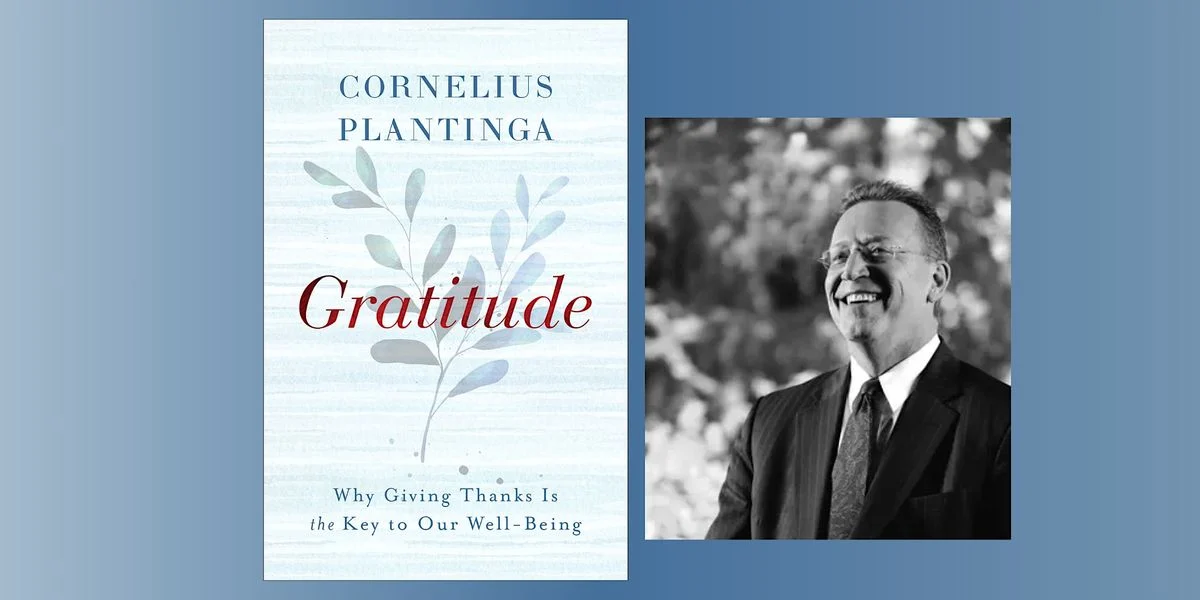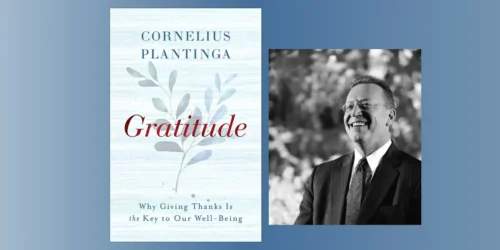

GRATITUDE: Why Giving Thanks Is the Key to Our Well-Being. By Cornelius Plantinga. Grand Rapids: MI: Brazos Press, 2024. 164 pages.
I was taught, as were many of my generation, that it is important to say please and thank you. The propriety of saying thank you is true even when a grandparent or an aunt gives you an ugly sweater. While this is a valuable lesson we might wonder if this word about etiquette is the same thing as experiencing gratitude. To answer the question, we need to define what gratitude involves and the value gratitude might bring to our lives. To answer that question, we need to ask what gratitude is. A further question has to do with the value that gratitude might bring to our lives.

Robert D. Cornwall
Several years ago, Diana Butler Bass offered an answer to the question about the nature and value of gratitude with her book Grateful: The Transformative Power of Giving Thanks. In that book, Diana noted that while many people are anxious, angry, and resentful, most reported being grateful. If that is true, then there seems to be a disconnect between the two. However, in the end, she wrote that gratitude can be transformative. Since we live in a seemingly anxious, angry, and resentful period of history, we need that transformative power of gratitude more now than ever. Six years after Diana released her book, Cornelius Plantinga, a senior research fellow at the Calvin Institute of Christian Worship and former President of Calvin Theological Seminary, has written a very similar book simply titled Gratitude. He also believes that gratitude can be transformative. If nothing else, gratitude can be good for you. If that’s true, then perhaps being grateful has benefits for the larger world.
Being thankful stands at the foundation of the Christian faith. The word Eucharist, a term applied to the Lord’s Supper, comes from the Greek eucharistia, which means to give thanks. The Eucharist is a foundational sacrament of the Christian faith. With that in mind, Plantinga points out that in the center of the word eucharist is the Greek word charis, which can be translated as grace and thus gratitude. He concludes in his introduction that Christianity should be understood as a religion of God’s grace (p. 3). Plantinga devotes his first chapter to answering the question of how gratitude might be a foundational element of the Christian faith. He writes that “gratitude is a glad sense of being gifted with something by someone and thus being indebted to the giver” (p. 7). It might be accompanied by a warm feeling, but not necessarily. Nevertheless, what Plantinga notes here is that in many ways gratitude is or perhaps should be a disposition. It can even be a character trait if it defines a person’s nature. Gratitude involves both being blessed by someone, including God and therefore being indebted. Maybe that can be repaid with a simple thank you, but maybe it requires more. I think of all the people who have contributed to my life, the people to whom I am truly indebted. Perhaps there is no repayment possible, but we can find ways of expressing gratitude, perhaps by paying it forward.
If gratitude can be, and perhaps should be, a disposition or a character trait for a Christian, then how do we get gratitude? That’s the question Plantinga asks in Chapter 2. In answering that question the author offers several possibilities, including spiritual ones. Developing that disposition might start with offering prayers at the dinner table. He also mentions the Jewish practice of the Passover, which includes the word Dayenu. That word speaks of something being enough. He writes that “The Dayenu is a remarkable device. With its wonderful interior linkages, it piles up examples of God’s generosity, celebrating each in turn, and thus piling up occasions for Israel’s gratitude” (pp. 18-19). Ultimately gratitude emerges from observation and reflection on God’s acts of goodness. While there are several ways of cultivating gratitude in the end our ability to develop gratitude is rooted in God’s grace. Recognizing that gratitude doesn’t come naturally to us, we need “the gracious power of the Holy Spirit to work in my heart and inspire my thanks” (p. 29).
While there are steps we can take to “get gratitude,” the next question that arises is “What blocks my gratitude?” In Chapter 3 Plantinga suggests there are both innocent and less innocent blockages to gratitude. The innocent blockages include such things as clinical anxiety and shame. It could even involve the attitude of the giver, such that the giver of the gift seeks to manipulate the recipient. On the other hand, there are less innocent ones such as cynicism, a sense of self-sufficiency, apathy, greed, resentment, and entitlement. Plantinga ultimately asks, with so many potential blockages it’s a wonder that anyone is grateful. Yet many are.
Having defined gratitude, noted different ways of cultivating it, and the possible blockages, both innocent and not-so-innocent, in Chapter 4, Plantinga addresses what might happen to us if we cultivate gratitude. Among the benefits Plantinga identifies are consolation, contentment, joy, and generosity (yes gratitude leads to generosity). We might expect such benefits, but what about healthier hearts? Apparently, some studies suggest grateful people have healthier hearts (though of course, we all know ungrateful people who live long lives without heart trouble, nonetheless this is interesting), lower blood pressure, and more. But, when it comes to experiencing gratitude, we should not let this be a self-help project. We should offer gratitude because it’s the right thing to do, even if we sleep better as a result.
Plantinga is a theologian so it is natural that he would want to bring in the Bible. So Plantinga asks what the Bible might say about gratitude (Chapter 5). When it comes to the Bible, suggests that gratitude can be triggered by memories of goodness. We see this connection between gratitude and memories of goodness in the Passover celebration as well as the Eucharist/Lord’s Supper. This pattern is found throughout Scripture as God calls both Israel and the church to remember what they have to be thankful for. He suggests that gratitude is rooted in being raised with Christ, thus making the connection with the death and resurrection of Jesus. Gratitude is also an expression of humanity’s creation in the image of God and is an aspect of Christian unity.
After laying a theological foundation by looking at what the Bible has to say about gratitude, Plantinga moves in Chapter 6 to answer the question of why we should thank God. The answer is found in several places including the gifts we receive in ordinary life as well as God’s creation and God’s grace to us as sinners. When it comes to giving thanks, as Plantinga writes in Chapter 7, things could be worse. In other words, gratitude is compatible with lament. Biblically, Plantinga points us to Jesus’ suffering on the cross, reminding us that God understands our sufferings. God is not aloof to our suffering. So, we might find light even amid darkness. So, we can be grateful even during difficult times. There is always something to be grateful for.
Having laid the foundations in the preceding chapters of Plantinga’s Gratitude, we are ready to consider the message of Chapter 8: “Savoring and Celebrating.” Grateful people savor things, perhaps as simple as a cup of coffee. They savor good things like a good book, beauty in nature, and many other things. As we savor the good things in life, we can then turn to celebration, as many Psalms invite us to do. There are lots of ways of celebrating things in our lives such as freedom on the Fourth of July or a sports team’s parade after winning a championship. Plantinga suggests that savoring and celebrating can overlap, but the difference is that celebration adds drama. So, “In celebration we don’t simply enjoy a good thing. We make a fuss over it. We get excited about it. We call other people’s attention to it. We raise our voices over it. ‘Shout for joy to the Lord’, Psalm 98 says” (p. 114). Grateful people savor and celebrate.
Not only do grateful people savor and celebrate, but they also take care of things (Chapter 9). Yes, we take care of the things we are grateful for, whether it is a beloved dog, a marriage, or nature. Grateful people take care of their faith. In fact, he suggests that “Good works are the best evidence of our gratitude to God.” (p. 137). Chapter 10 summarizes what we’ve explored using the Thanksgiving image of the cornucopia, inviting us to ponder all the blessings we have received. The foundation for this contemplation is the call to seek first God’s realm, for if we do so we’ll “never run out of good things to do” (p. 151).
Cornelius Plantinga reveals in this readable and succinct book he simply titles Gratitude that gratitude is a central theme of the Christian faith. It is part of the transformative nature of the Christian faith at its best. It is celebrated at the Lord’s Table as we give thanks to God for all of God’s gifts, including the presence of Jesus and the gift of the Holy Spirit. While being grateful has positive effects on our lives, including our bodies, such that grateful people often live flourishing lives, it’s much bigger than that. It has more universal effects. If this is true, as Plantinga believes that Scripture teaches, then it is a good thing to cultivate a disposition of gratitude. With this book on Gratitude, Cornelius Plantinga seeks to help us cultivate that disposition, for as we do so, we seek the realm of God.
This review originally appeared on BobCornwall.com.
Robert D. Cornwall is an ordained minister in the Christian Church (Disciples of Christ). Now retired from his ministry at Central Woodward Christian Church (Disciples of Christ) of Troy, Michigan, he serves as Minister-at-Large in Troy. He holds a Ph.D. in Historical Theology from Fuller Theological Seminary and is the author of numerous books including his latest “Second Thoughts about the Second Coming: Understanding the End Times, Our Future, and Christian Hope” coauthored with Ronald J. Allen. His blog Ponderings on a Faith Journey can be found at www.bobcornwall.com.



